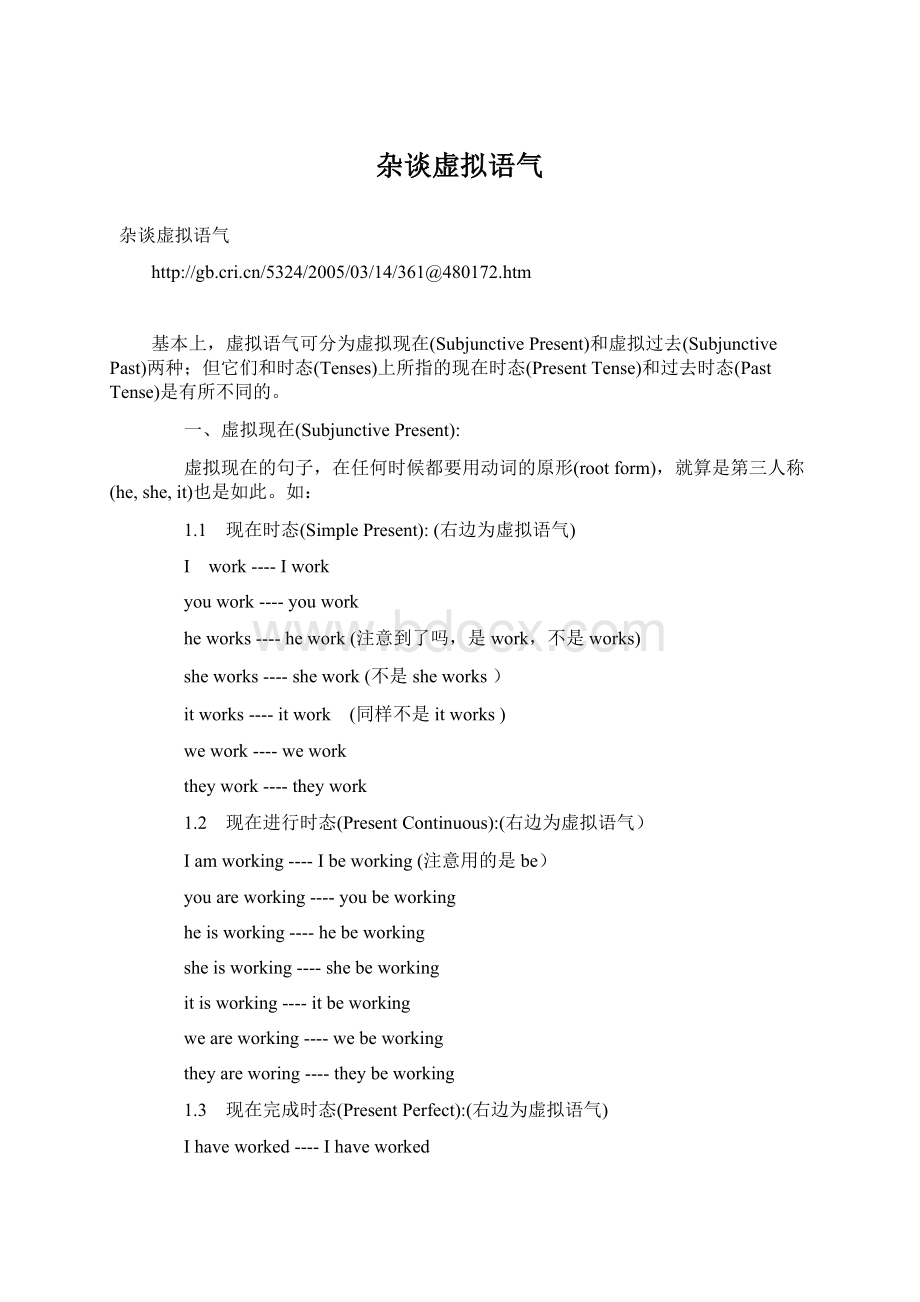杂谈虚拟语气.docx
《杂谈虚拟语气.docx》由会员分享,可在线阅读,更多相关《杂谈虚拟语气.docx(10页珍藏版)》请在冰豆网上搜索。

杂谈虚拟语气
杂谈虚拟语气
基本上,虚拟语气可分为虚拟现在(SubjunctivePresent)和虚拟过去(SubjunctivePast)两种;但它们和时态(Tenses)上所指的现在时态(PresentTense)和过去时态(PastTense)是有所不同的。
一、虚拟现在(SubjunctivePresent):
虚拟现在的句子,在任何时候都要用动词的原形(rootform),就算是第三人称(he,she,it)也是如此。
如:
1.1 现在时态(SimplePresent):
(右边为虚拟语气)
I work----Iwork
youwork----youwork
heworks----hework(注意到了吗,是work,不是works)
sheworks----shework(不是sheworks)
itworks----itwork (同样不是itworks)
wework----wework
theywork----theywork
1.2 现在进行时态(PresentContinuous):
(右边为虚拟语气)
Iamworking----Ibeworking(注意用的是be)
youareworking----youbeworking
heisworking----hebeworking
sheisworking----shebeworking
itisworking----itbeworking
weareworking----webeworking
theyareworing----theybeworking
1.3 现在完成时态(PresentPerfect):
(右边为虚拟语气)
Ihaveworked----Ihaveworked
youhaveworked----youhaveworked
hehasworked-----hehaveworked(用的还是have)
shehasworked----shehaveworked
ithasworked----ithaveworked
wehaveworked----wehaveworked
theyhaveworked----theyhaveworked
1.4 现在完成进行时态(PresentPerfectContinuous):
(右边为虚拟语气)
Ihavebeenworking----Ihavebeenworking
youhavebeenworking----youhavebeenworking
hehasbeenworking----hehavebeenworking (是hehave,不是hehas)
shehasbeenworking----shehavebeenworking
ithasbeenworking---ithavebeenworking
wehavebeenworking----wehavebeenworking
theyhavebeenworking----theyhavebeenworking
二、虚拟过去(SubjunctivePast)
虚拟过去的动词无论在什么情况之下都要用过去复数形式。
如:
动词be,在虚拟过去中要用were。
2.1 过去时态(SimplePast):
(右边为虚拟语气)
Iworked----Iworked
youworked----youworked
heworked----heworked
sheworked----sheworked
itworked----itworked
weworked----weworked
theyworked----theyworked
2.2 过去进行时态(PastContinuous):
(右边为虚拟语气)
Iwasworking----Iwereworking(注意是Iwere)
youwereworking----youwereworking
hewasworking----hewereworking(是hewere喔)
shewasworking----shewereworking
itwasworking----itwereworking
wewereworking----wewereworking
theywereworking----theywereworking
2.3 过去完成时态(PastPerfect):
(右边为虚拟语气)
Ihadworked----Ihadworked
youhadworked----youhadworked
hehadworked----hehadworked
shehadworked----shehadworked
ithadworked----ithadworked
wehadworked----wehadworked
theyhadworked----theyhadworked
(全部都用had!
)
2.4 过去完成进行时态(PastPerfectContinuous):
(右边为虚拟语气)
Ihadbeenworking----Ihadbeenworking
youhadbeenworking----youhadbeenworking
hehadbeenworking----hehadbeenworking
shehadbeenworking----shehadbeenworking
ithadbeenworking----ithadbeenworking
wehadbeenworking----wehadbeenworking
theyhadbeenworking----theyhadbeenworking
(全部都是hadbeen)
三、简单的祝愿和命令:
3.1 祝愿
1. Mayyoubehappy.(注意那个be)祝你幸福。
2. Mayyouhaveagoodtime.
3. Maythefriendshipbetweenuslastlong,
4. Haveagoodjourney!
祝你旅途愉快!
3.2 命令
1.命令虚拟语气只能用在第二人称(you),而且通常省略主语(也就是you)。
2.句子尾通常加上感叹号:
!
3.虚拟语气动词用一般现在时态(SimplePresent),如:
work,be,go
4.否定形式的命令语气,可用助动词do,加上not。
1. Work!
2. Workharder!
3. Bemorealert!
(虚拟语气动词Be)
4. Yougoout!
5. Donotworksohard.(donot表示否定的虚拟语气)
6. Don"tbeafraid.(口语中常用don"t代替donot)
四、在现在时态句里,用情态动词(ModalVerb)的过去时态
(could,might,should,would)表示说话人的谦虚、客气、有礼、委婉等:
1.Wouldyoubekindenoughtoshowmethewaytothepostoffice.
(情态动词would,表示客气有礼)
2.Itwouldbebetterforyounottostayuptoolate.(表示委婉)
五、虚拟语气在宾语从句(SubordinateClasue)中的用法:
5.1在wish后的虚拟语气宾语从句(可省略它的that):
表示:
a.和现在的事实相反;
b.和过去的事实相反;
c.对将来的主观愿望。
5.1.1现在情况的虚拟,从句用过去式或过去进行式(时间上是同时的):
1.Iwish(that可省略,下同)Iknewtheanswertothequestion.
(wish,动词过去式knew)
我希望知道这个答案。
(事实上是不知道)
2.Iwishitwerespringinmyhometownalltheyeararound.
(wish,were)
但愿我的家乡四季如春。
(事实上不可能)
3.IwishIwereabird.(wish,were)
但愿我是只小鸟。
(事实上不可能。
)
4.Whenshewasattheparty,shewishedshewereathome.
(wished,过去虚拟动词were)(事实上并不在家)
5.NowthatheisinChina,hewishesheunderstoodChinese.
(wishes,过去虚拟动词understood)
现在他在中国,他希望能懂得中文。
(事实上并不懂)
6.Whenwebeginthetrip,theywillwishtheywerewithus.
(willwish,过去虚拟动词were)(事实上并不和我们在一起)
5.1.2过去情况的虚拟,从句动词用"had+过去分词"(时间上较前):
1.Iwish(that可省略,下同)Ihadn"twastedsomuchtime.
我后悔不该浪费这么多时间。
(事实上已浪费了)
2.Hewisheshehadn"tlostthechance.
他真希望没有失去机会。
(其实已失去)
3.Wewishedhehadspokentous.
(wished,had+spoken)(事实上他并没同我们讲)
4.Iwishyouhadcalledearlier.
(wish,had+called)(事实上已迟了)
5.Theywillwishtheyhadlistenedtoussooner.
(willwish,had+listened)(事实上并不如此)
5.1.3将来情况的虚拟(表示将来的主观愿望),从句动词用"would/should/
could/might+动词原形"(时间上较后):
(请注意:
主句和从句的主语不相同)
1.Iwishitwouldstopraining.(虚拟动词would+动词原形stop)
我希望雨能停止。
(事实上雨还在下着呢)
2.Iwishyouwouldbequiet.(would+be)
我希望你安静一些。
(事实上那家伙还在吵着呢)
3.Youwishedshewouldarrivethenextday.(would+arrive)
你希望她第二天会到。
(事实上她还没到)
4.Iwishshewouldchangehermind.(would+change)
我希望她会改变主意。
5.Hewillwishwewouldjoinhimthefollowingweek.(would+join)
(只是希望我们和他在一起,实际上还没在一起)
5.2 除了wish之外,下列各动词(如suggest)的后面的虚拟语气宾语从句,其谓语用:
"should+动词原形"表示建议(suggest)、坚持(insist)等虚拟语气:
*suggest(建议),recommend(推荐),advise(劝告),propose(建议)
*insist(坚持),consent(允诺)
*decide(决定),order(命令)
*request(要求),demand(要求),desire(期望),ask(要求)
*maintain(主张),urge(催促)
1. Isuggestthatwe(should可省略,下同)startthemeetingatonce.
(suggest,should+start)(表示建议立即开会)
2. Thedoctorsuggestedthathe(should)trytolosehisweight.
(suggested,should+try)(表示建议你应该减肥喔)
3.Heinsistedthatallofus(should)bethereontimebyanymains.
(insisted,should+be)(表示坚持,无论如何都要准时到那儿。
你再讲也没用哩!
)
4.Heinsistedthatwe(should)tellhimthenews.
(insisted,should+tell)(表示非要你告诉他不可)
5.Heorderedthatthestudents(should)washtheclotheseveryweekbythemselves.
(ordered,should+wash)(表示命令学生们每周自己洗衣服)
六、虚拟语气在表语从句、同位语从句中的用法:
下列名词后的表语从句或同位语从句,也用"should+动词原形"表示虚拟语气:
*demand(要求),desire(请求),requirment(要求)
*advice(劝告),recommendation(建议),suggestion(建议)
*order(命令)
*necessity(必要地),preference(优先)
*proposal(计划),plan(计划), idea(办法)
1. Theadviceisthatwe(should可省略,下同)leaveatonce.
(名词advice,should+leave)(表示加以劝告)
2.Myideaisthatwe(should)getmorepeopletoattendtheconference.
(idea,should+get)(表示做出主意)
3.Imakeaproposalthatwe(should)holdameetingnextweek.
(proposal,should+hold)(表示做出计划)
虚拟语气之类的语法真是错综复杂,不是一时半刻就能弄清楚的。
再会。
七、虚拟语气在主语从句中的用法
句型:
Itis(或was)+形容词(或过去分词)+that……+should+动词原形……
句子:
Itisnaturalthatsheshoulddoso.(形容词natural,should+动词原形do)
常用的形容词:
*natural(自然的),appropriate(适当的),advisable(合适的),preferable(更可取的),better(更好的)
*necessary(必须的),important(重要的),imperative(急需的),urgent(急迫的),essential(本质的),vital(必不可少的)
*probable(很可能的),possible(可能的)
*desirable(极好的)
常用的过去分词(PastParticiple):
*required(需要的),demanded(要求),requested(被请求的),desired(要求)
*suggested(建议),recommended(推荐)
*orderd(命令)
1.Itisnecessarythatwe(should可省略,下同)haveawalknow.
(necessary,should+have)(表示有需要去散步)
2.Itwasnecessarythatwe(should)makeeverythingreadyaheadoftime.
(necessary,should+make)(表示有必要事先做好准备)
3.Itisrequiredthatnobody(should)smokehere.
(required,should+smoke)(表示要求不要在此抽烟)
4.Itisimportantthateverypupil(should)beabletounderstandtheruleofschool.
(important,should+be)(表示重要的是学生都能了解校规)
5.It"simportantthatwe(should)takegoodcareofthepatient.
(important,should+take)(表示重要的是照顾好病人)
八、虚拟语气在条件从句(Protasis)中的用法:
条件从句有两类:
(1)真实条件句;
(2)虚拟条件句。
如果假设情况有可能发生的,就是"真实条件句"。
如:
1.Iftimepermits,we"llgofishingtogether.
(如果有时间的话,我们就一起去钓鱼。
)
如果假设的情况与事实相反,则为"虚拟条件句"。
如:
1.Ifithadrainedyesterday,wewouldhavestayedathome.
(如果昨天下雨的话,我们就会留在家里。
)
这回我们要谈的就是关于"虚拟条件句"的一些句型。
*这种句子一般由"从句"(SubordinateClause)和"主句"(MainClause)组成。
如上例:
Ifithadrainedyesterday,wewouldhavestayedathome.
"Ifithadrainedyesterday"就是"从句";"wewouldhavestayedathome"则为"主句。
*无论"从句"或"主句"的谓语都要用虚拟语气。
它们所用的动词有三种时态(Tenses),就是:
现在时态、过去时态、将来时态。
*句型:
8.1 与现在事实相反的假设(事情的发生都在同一时间内):
从句:
if+主语+动词的过去式(be用were)+……
主句:
主语+would(should,could,might)+动词原形+……
1.IfIwereyou,Iwouldgowithhim.
(从句IfIwereyou,主句Iwouldgowithhim.)
2. IfIwereyou,Ishouldbuyit.
(从句用过去式动词were,主句用动词原形buy)
3. IfIhadtime,IwouldstudyFrench.(如果有时间,我会学习法文。
)
(从句用过去式动词had,主句用动词原形study)
4.IfsheknewEnglish,shewouldnotaskmeforhelp.(如果她懂英文,她就不必要我帮了。
)
(从句用过去式动词knew,主句用动词原形ask)
注意:
如果动作在进行中,主句要用:
"主语+wouldbe+进行式动词+……"
5.Iftheywerehere,hewouldbespeakingtothemnow.
(从句用过去式动词were,主句用wouldbespeaking)
8.2 与过去事实相反的假设(假设从句的事实为过去的事):
从句:
If+主语+had+过去完成式动词+……
主句:
主语+would(should,could,might)+have+过去完成式动词+……
1.Ifyouhadstudiedharderlastterm,youcouldhavepassedexam.
(从句动词用hadstudied,主句动词用havepassed)
如果你在上个学期用功一些,你就会在考试中过关了。
2.Ifyouhadtakenmyadvice,youwouldn"thavefailedintheexam.
(从句动词用hadtaken,主句动词用havefailed)
如果你当时听从我的劝告的话,你就不会在考试中失败了。
3.Ifyouhadgotupearlier,youcouldhavecaughtthetrain.
(从句动词